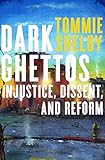Dark ghettos : injustice, dissent, and reform / Tommie Shelby.
Material type: TextPublication details: Cambridge, Massachusetts : The Belknap Press of Harvard University Press, (c)2016.Description: 1 online resource (340 pages)Content type:
TextPublication details: Cambridge, Massachusetts : The Belknap Press of Harvard University Press, (c)2016.Description: 1 online resource (340 pages)Content type: - text
- computer
- computer
- online resource
- online resource
- 9780674974647
- HV4045 .D375 2016
- COPYRIGHT NOT covered - Click this link to request copyright permission: https://lib.ciu.edu/copyright-request-form
- digitized 2019 HathiTrust Digital Library committed to preserve
| Item type | Current library | Collection | Call number | URL | Status | Date due | Barcode | |
|---|---|---|---|---|---|---|---|---|
 Online Book (LOGIN USING YOUR MY CIU LOGIN AND PASSWORD)
Online Book (LOGIN USING YOUR MY CIU LOGIN AND PASSWORD)
|
G. Allen Fleece Library ONLINE | Non-fiction | HV4045 (Browse shelf(Opens below)) | Link to resource | Available | on1085908620 |
"Why do ghettos persist?" Tommie Shelby asks in Dark Ghettos. Today, ghettos are widely seen as social problems that public policy should aim to solve. Shelby calls this the "medical model" because it portrays ghettos as sick patients in need of treatment. In his view, this model ignores the political agency of the ghetto poor and the underlying social structures that perpetuate disadvantage in black communities. Shelby argues that we should conceive of ghettos within a "justice paradigm" instead. Adopting a Rawlsian framework, he considers the existence of ghettos as a sign of deeply embedded social injustice, and he offers a "nonideal" social theory, establishing what the government and citizens are obligated and permitted to do within fundamentally unfair conditions. His theory arises through practical considerations: should the American government enforce residential diversity? Should welfare programs disincentivize single motherhood? For those who live in ghettos, is voluntary non-work--or street violence, or hip-hop--a just and valid form of dissent? Ultimately, Shelby aims to establish principles that will lead to the abolishment of ghettos through just reform.--
Includes bibliographies and index.
Introduction: Rethinking the problem of the ghetto -- Part I. Liberty, equality, fraternity. Injustice ; Community ; Culture -- Part II. Of love and labor. Reproduction ; Family ; Work -- Part III. Rejecting the claims of law. Crime ; Punishment ; Impure dissent -- Epilogue: Renewing ghetto abolitionism.
COPYRIGHT NOT covered - Click this link to request copyright permission:
https://lib.ciu.edu/copyright-request-form
Master and use copy. Digital master created according to Benchmark for Faithful Digital Reproductions of Monographs and Serials, Version 1. Digital Library Federation, December 2002. MiAaHDL
http://purl.oclc.org/DLF/benchrepro0212
digitized 2019 HathiTrust Digital Library committed to preserve pda MiAaHDL
There are no comments on this title.
